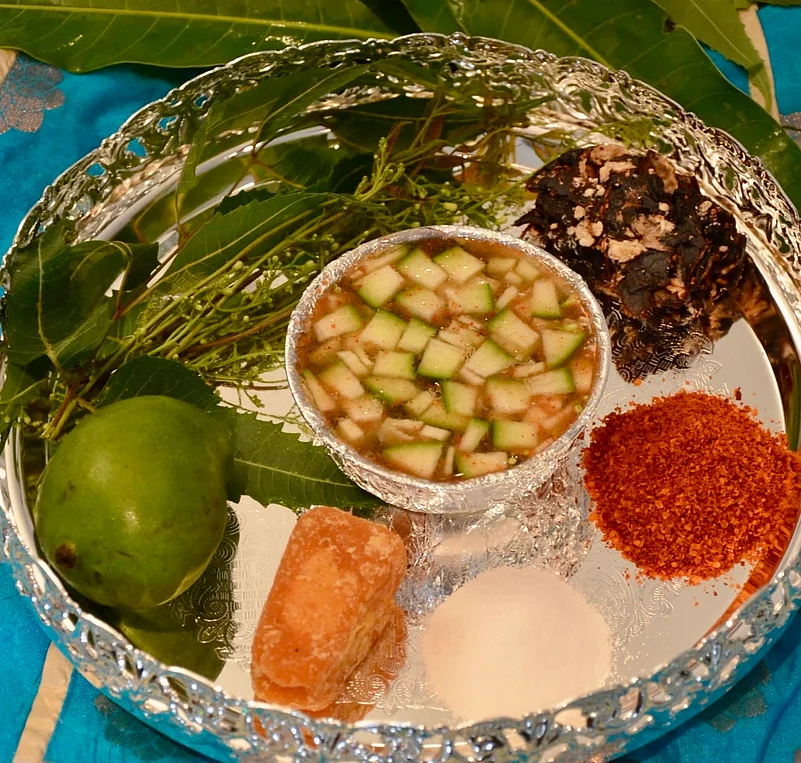As Ugadi, the Telugu New Year is fast approaching, the festival is celebrated with great fervor and joy in the states of Andhra Pradesh, Karnataka, Telangana and other Southern parts of India. While vibrant decorations, family gatherings, and traditional meals mark the day, the centerpiece of the festivities is undoubtedly Ugadi Pachadi, a unique and symbolic dish that offers a powerful lesson on accepting the multifaceted nature of life. More than just a culinary creation, Ugadi Pachadi is a philosophical statement, a reminder that life is a blend of experiences, both pleasant and unpleasant, and that we must embrace them all with equanimity. It's a tangible representation of the belief that happiness and sorrow, success and failure, are all intertwined and necessary for growth.
The Alchemy of Flavors: What Makes Ugadi Pachadi Unique
Ugadi Pachadi is a traditional South Indian chutney made during the Ugadi festival, which marks the beginning of the New Year in the Hindu calendar. It is a unique dish that combines six different flavors: sweet, sour, salty, bitter, spicy, and tangy. These flavors represent the various experiences of life, both good and bad. Ugadi Pachadi isn't just a sweet or sour concoction; it's a deliberate combination of six distinct flavors, each representing a different emotion or aspect of life:
Sweet (Jaggery/Sugar): In the traditional Ugadi pachadi, jaggery represents sweetness and happiness in life. Jaggery's inclusion serves as a reminder that life brings moments of joy, and these sweet experiences are an essential part of the overall journey.
Bitter (Neem Flowers): The neem flower represents the sadness, disappointment, and the unavoidable bitterness of life. The neem flower's bitterness serves as a reminder that life is not always sweet and that we must be prepared to face challenges and hardships. It's inclusion is to show that life is a mixture of all emotions, and that all of them should be accepted.
Tangy (Raw Mango): Raw mango signifies unpleasant surprises, challenges, and the ability to overcome obstacles. The raw mango's inclusion serves to remind us that life encompasses unexpected and sometimes sharp turns, and that these experiences are an integral part of our journey.
Salty (Salt): Salt represents fear, anxieties, and the natural apprehensions we face. The inclusion of salt serves as a reminder that life inevitably includes moments of anxiety and uncertainty, and that these experiences are an integral part of the human journey.
Spicy (Green Chili/Red Chili Powder): Green Chilli smbolizes anger, passion, and the fiery intensity of life. Just as life presents moments of anger or frustration, the green chili in the pachadi serves as a reminder to acknowledge and accept these emotions as part of the human experience.
Sour (Tamarind Juice): Tamarind juice is one of the six key ingredients in Ugadi Pachadi, and it represents the sourness of life. It is believed to symbolize the challenges and difficulties that we all face from time to time. However, just as tamarind juice adds a unique flavor to the pachadi, these challenges can also add a unique flavor to our lives, making us stronger and more resilient.
The Spiritual Significance: A Lesson in Equanimity
Consuming Ugadi Pachadi transcends mere ritual, serving as a profound spiritual practice that cultivates acceptance, equanimity, resilience, growth, perspective, and gratitude; by intentionally tasting each distinct flavor—bitter, sour, sweet, spicy, tangy—and then experiencing their harmonious blend, one learns to embrace the full spectrum of life, recognizing that both joyful and challenging experiences are essential for personal development and inner balance, fostering a deeper appreciation for life's complexities and the opportunities for growth they present.
Ugadi Pachadi: A Ritual of Renewal
Ugadi Pachadi is a traditional South Indian dish prepared during the Ugadi festival, symbolizing the six different tastes of life. It typically consists of neem flowers for bitterness, jaggery for sweetness, tamarind for sourness, raw mango for tanginess, chili powder for spice, and salt. These ingredients are mixed together to create a unique blend of flavors, representing the various experiences one might encounter in life.
How to prepare the Ugadi Pachadi:
Firstly, fresh neem flowers should be properly cleaned under running water and then tapped dry. If using dried neem flowers, soften them by soaking them in water for a few minutes.
Make a jaggery syrup by dissolving the jaggery in enough water in a small bowl (one cup is a enough amount). Set aside the syrup after straining it to remove any remaining contaminants and make it clear.
Soak a small tamarind pod in boiling water for approximately ten minutes. To extract the juice, squeeze and filter the tamarind pulp.
Combine half of the raw neem leaves, green chilies, and mango pulp in a mixing dish.
Combine the jaggery syrup and tamarind water in a bowl. Using a whisk, combine all the ingredients.
Finally, bring the pot's contents to a boil and season with salt to taste. Make the necessary adjustments to the seasoning.
To bring out all the flavors, let the Ugadi Pachadi sit for 15 to 20 minutes.
Your Ugadi Pachadi ought to have finished cooking at this point and be ready to eat. Savor this delicious and significant dish.
Ugadi Pachadi is more than just a dish; it's a powerful metaphor for life's journey. It's a reminder that life is a complex and multifaceted experience, and that by embracing all its flavors, both sweet and bitter, we can find true happiness and fulfillment. As you celebrate Ugadi and savor the unique taste of Ugadi Pachadi, remember the profound lessons it offers and strive to live a life filled with balance, resilience, and gratitude.
Wishing you a Happy and Prosperous Ugadi!























